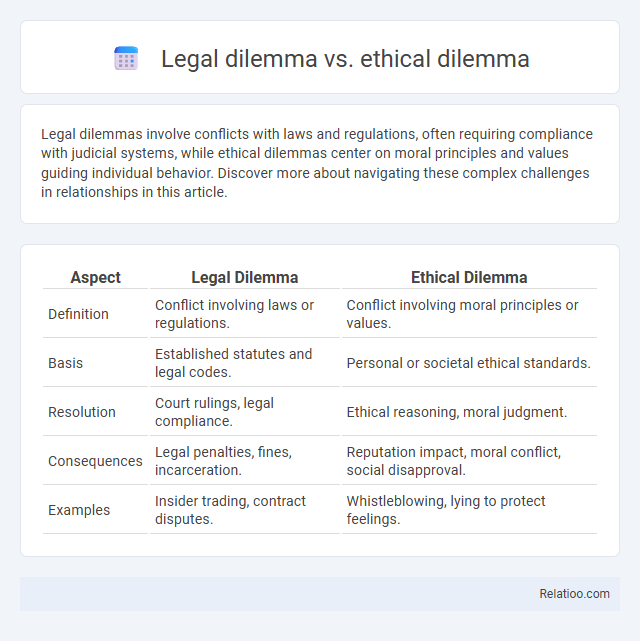Legal dilemmas involve conflicts with laws and regulations, often requiring compliance with judicial systems, while ethical dilemmas center on moral principles and values guiding individual behavior. Discover more about navigating these complex challenges in relationships in this article.
Table of Comparison
| Aspect | Legal Dilemma | Ethical Dilemma |
|---|---|---|
| Definition | Conflict involving laws or regulations. | Conflict involving moral principles or values. |
| Basis | Established statutes and legal codes. | Personal or societal ethical standards. |
| Resolution | Court rulings, legal compliance. | Ethical reasoning, moral judgment. |
| Consequences | Legal penalties, fines, incarceration. | Reputation impact, moral conflict, social disapproval. |
| Examples | Insider trading, contract disputes. | Whistleblowing, lying to protect feelings. |
Introduction to Legal and Ethical Dilemmas
Legal dilemmas involve conflicts between laws or regulations where a clear legal resolution is required, while ethical dilemmas concern situations where moral principles clash, lacking straightforward right or wrong answers. A general dilemma represents any difficult decision-making scenario involving competing values or interests, requiring careful judgment. Your understanding of these distinctions helps navigate complex professional environments by balancing legal obligations with ethical considerations.
Defining Legal Dilemmas
Legal dilemmas arise when you face conflicts between laws or when legal obligations clash, requiring a decision within the framework of established statutes and regulations. Ethical dilemmas involve situations where moral principles are in conflict, challenging your personal or professional integrity beyond legal considerations. A general dilemma refers to any difficult choice between two or more options, not necessarily tied to law or ethics but involving significant consequences.
Understanding Ethical Dilemmas
Ethical dilemmas involve conflicts between moral principles where choosing one value may compromise another, highlighting the complexity of right versus right decisions. Unlike legal dilemmas, which center on compliance with laws and regulations, ethical dilemmas require deeper reflection on personal and societal values beyond written rules. Understanding ethical dilemmas helps you navigate situations where the correct course of action is not legally mandated but morally significant.
Key Differences Between Legal and Ethical Dilemmas
Legal dilemmas involve conflicts where the right course of action is dictated by laws and regulations, whereas ethical dilemmas center on moral principles and values that may not be codified into law. You may face situations where an action is legally permissible but ethically questionable, highlighting the distinction between adhering to statutes and following personal or societal ethics. Understanding these key differences helps in navigating decisions where legality and morality diverge, ensuring that Your choices align with both legal requirements and ethical standards.
Intersections of Law and Ethics
Legal dilemmas involve conflicts between laws or legal obligations, while ethical dilemmas arise from competing moral principles or values. Both types of dilemmas intersect significantly, as laws often reflect underlying ethical standards, but situations may occur where legal requirements contradict personal or societal ethical beliefs. Understanding the nuanced relationship between law and ethics is crucial for resolving dilemmas that challenge both legal compliance and moral responsibility.
Real-World Examples of Legal vs Ethical Dilemmas
Legal dilemmas involve conflicts between laws or legal duties, such as when a business must choose between obeying local regulations and meeting contractual obligations; ethical dilemmas arise from conflicts between moral principles, like a doctor deciding whether to break patient confidentiality to prevent harm. A classic legal versus ethical dilemma example is whistleblowing: legally, reporting corporate misconduct fulfills statutory obligations, but ethically, it may betray loyalty or confidentiality. Understanding the distinction helps you navigate real-world challenges where following the law does not always align with ethical behavior.
Consequences of Legal and Ethical Choices
Legal dilemmas involve conflicts between laws or legal obligations where non-compliance may lead to penalties, fines, or legal prosecution. Ethical dilemmas pertain to moral principles, where choosing one value over another affects your integrity and societal trust without necessarily breaking laws. Your decisions in both legal and ethical dilemmas carry significant consequences: legal choices impact formal justice systems, while ethical choices influence personal reputation and community relationships.
The Role of Professional Codes
Professional codes act as pivotal guides in resolving legal, ethical, and general dilemmas by establishing clear standards for behavior and decision-making within a profession. While legal dilemmas involve conflicts with laws and regulations and ethical dilemmas concern moral principles, professional codes help you navigate these challenges by aligning your actions with both legal requirements and ethical expectations. Their role ensures consistency, accountability, and integrity, providing a framework that supports sound judgment in complex situations.
Strategies for Resolving Dilemmas
Strategies for resolving legal dilemmas focus on adhering strictly to laws and regulations while consulting legal experts to ensure compliance and mitigate risks. Ethical dilemmas require a values-based approach, often involving reflective reasoning, consultation with ethical guidelines, and balancing stakeholder interests to uphold moral principles. Your decision-making process benefits from distinguishing whether the issue is legal, ethical, or both, allowing tailored strategies that address compliance, integrity, or practical consequences effectively.
Conclusion: Navigating Legal and Ethical Challenges
Navigating legal and ethical challenges requires understanding that legal dilemmas involve conflicts within the boundaries of law, while ethical dilemmas arise from moral principles often beyond legal mandates. A dilemma generally presents a choice between equally undesirable options, demanding critical evaluation of consequences and values. Effective resolution depends on balancing compliance with legal standards and adherence to ethical considerations to make informed, responsible decisions.

Infographic: Legal dilemma vs Ethical dilemma
 relatioo.com
relatioo.com